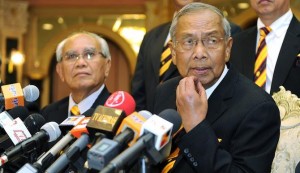Saksama: A new front in M’sia’s politics

Individually, the present grouping can be regarded as ‘mosquito’ parties. Collectively, can it amount to more?
Lim Teck Ghee, The Heat Malaysia
Sabah and Sarawak have been seen as Barisan Nasional’s fixed deposits since the formation of Malaysia.
But instead of rewarding the two states for their loyalty to the ruling coalition, the two states, especially Sabah, have been treated like step children and unequal partners in what, under the terms of the Malaysia agreement signed in 1963, has been viewed by the Borneo side as a federation of three equal components comprising the two East Malaysia states and the states of Peninsula Malaya as a whole.
The list of perceived injustices, discriminatory treatment and broken promises endured by the two states at the hands of an Umno dominated Barisan polity runs to more than a few pages. According to pro-autonomy activists, it includes the following:
– disproportionally meager returns from the two states’ oil and gas resources;
– de-secularisation and creeping Islamisation;
-internal colonization by the federal civil service establishment which has marginalized local Sarawakians and Sabahans in the running of their own states;
– Putrajaya’s collaboration with corrupt leaders which has enriched a small minority and despoiled the environment at the expense of the native communities;
– Tun Dr Mahathir Mohamad’s infamous “project IC” which resulted in a massive influx of illegal immigrants, their registration as voters in Sabah, and the consequential adverse repercussions on the local citizenry.
Resistance to what some critics see as a Kuala Lumpur-orchestrated “new colonialism” has been smoldering intermittently and ineffectively during the past 50 years.
This resistance has now reached a new stage with the formation of Gabungan Rakyat Saksama, the latest of opposition coalitions to emerge in the country but with the key difference in that it is the East Malaysia partners that are playing the leading role in this, the most recent attempt to break the nation free from the monopoly of Barisan rule.

